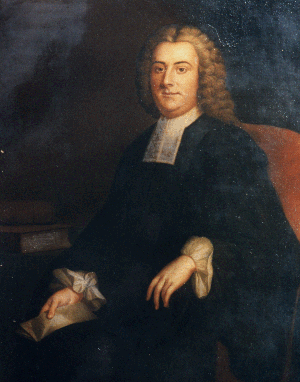
Daniel Dulany (privately owned; attributed to John Wollaston)

Daniel Dulany (privately owned; attributed to John Wollaston)
Introduction:
Daniel Dulany (1722-1797), the son of an Irish indentured servant who accumulated great wealth, was one of the foremost lawyers of his day. Rising to prominence as an office holder under the Calverts in Maryland, he lived to see his last surviving expatriate brother killed in a duel with an Anglican priest, and his son's extensive Maryland inheritance confiscated for his adherence to the losing side in the American Revolution. Throughout his life Daniel advocated resolution of disputes through and by the law, even going so far to advance his theories anonymously in well written pamphlets which he continued to author long after the Revolution was settled by force. He is best known for his defense of the colonies over the Stamp Act (1765) in which he argued for no taxation without representation. Although he wrote that pamphlet anonymously, his authorship was quickly revealed, and he was widely acclaimed on both sides of the Atlantic for his well reasoned, spirited defense of the colonies, in which he called upon Parliament to back down and rescind the tax. Parliament did, but in 1773 Dulany did not fare as well as Antillon (from a combination of 'anti' and the old english word for unfair taxes) in a heated newspaper debate with Charles Carroll of Carrollton (First Citizen). Dulany believed that the Maryland Charter and the English Parliament were supreme and that the Maryland Legislature should and could not act independently of, nor alter either. Increasingly the public sided with Carroll, culminating three years later in the signing of the Declaration of Independence, and the commencement of a successful five year war to sever the colonies from England.
The following letter to Daniel Dulany was written by an old friend, Dr. Messenger Monsey (1693-1788), who held the lifetime post of physician to the Chelsea Hospital. and lived there in disgruntled retirement. It was found in a house called Bostwick (originally 'Bostock' after the Lowndes family home in England) in Bladensburg, Maryland that once belonged to Daniel Dulany's wife's sister and her husband Christopher Lowndes. It was donated to the Maryland State Archives by the former owners of the house, Susanna and Timothy Yatman.
Dr. Monsey was known for his strong support of the Whig cause, and had become friends with Dulany 31 years before when Dulany commenced his studies at Eaton. Underlying the conversational banter of the letter and the loneliness of an old man, are strong ties to Whig Party ideas of political and social behavior steeped in the framework of English Constitutional law, all of which had a profound influence on Dulany. "Always eccentric and rough in his manners, he [Monsey] treated his noble patrons with ostentatious familiarity. Walpole once asked how it was that no one but Monsey ever contradicted him." (DNB) Willing to contradict a Prime Minister, Monsey never-the-less feared the radical urban extremism of fringe Whigs like Wilkes and those who would bring the government down with nothing to place in its stead:
Talking of politics was always my aversion. In my case tis arguingAccording to his biographical sketch in the Dictionary of National Biography (1967 ed., volume XIII, pp. 640-641), Dr. Monsey was quite well known among the literary and theatrical circles of his day. He was said to have referred to Elizabeth Montagu (1720-1800) as "a more perfect human being than was ever created," to which Edmund Burke purportedly replied "And I do not think that he said a word too much." Apparently he was less enamored of Mrs. Thaila Abington (1737-1815), the actress who played Ophelia to David Garrick's Hamlet. According to John Taylor (1757-1832) to use Monsey's words, "she appeared like a mackerel on a gravel walk."
without ideas and parising, or condemning without knowledge and I never could
bear talking for talking sake. I can discourse about a mousetrap or a
Barrel of oysters, because I have see one & eaten of the other, but I would
not guess at the capacity or motives of a prime minister for the world
My present opinion tis however we have no body that is able to govern and
very few willing to be governed.--- We are a nation of kings, which
without a pindaric transition I think is or soon will be anation of
Slaves, if God does not save us by a Miracle & I think nothing else can
We are just at the point of Luxury & dissipation at which Rome fell &
I don't think we have grace enought to deserve a better a better fate
For additional reading on Daniel Dulany see Aubrey C. Land, The Dulanys
of Maryland. Baltimore: The Johns Hopkins University Press, 1955, 1968.
For Dr. Monsey see his biographical sketch in
the Dictionary of National Biography.
Contents:
Full Color images (48 megabytes of a self-viewing
file)
Black & white images (ca. 20 mb tif file requiring Kodakimg as a viewer).
Author:
Introduction and transcription by Dr. Edward C. Papenfuse; proof reading
and editing by Lynne MacAdam and Emily Squires; Collection finding aid by
Emily Murphy and Dr. Papenfuse. 10/1999. ©Maryland State Archives,
an Archives of Maryland publication
 |
|